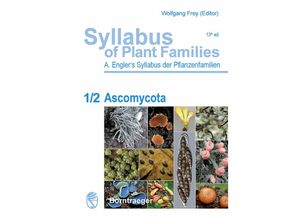Part 1 2 of Engler: Syllabus of Plant Families - Ascomycota provides a thorough treatise of the
world-wide morphological and molecular diversity of the fungal phylum Ascomycota. The
Ascomycota (including lichenized forms) are the most diverse group of fungi with a fascinating
range of morphological and biological variation distributed from the arctic tundra and
subantarctic vegetation formations to tropical rainforests and semi-deserts to freshwater and
marine ecosystems. The present volume is an updated synthesis of classical
anatomical-morphological characters with modern molecular data incorporating numerous new
discoveries made during the last ten years providing a comprehensive modern survey covering
all families and genera of the Ascomycota including detailed family descriptions. While the
Fungi are not part of the Plant Kingdom they are formally included within the classic Engler's
title Syllabus der Pflanzenfamilien Syllabus of Plant Families” which comprised families of
blue-green algae algae fungi lichens ferns gymnosperms and flowering plants. Engler's
Syllabus of Plant Families has since its first publication in 1887 aimed to provide both the
researcher and particularly the student with a concise survey of the plant kingdom as a whole
presenting all higher systematic units right down to families and genera of plants and fungi.
In 1954 more than 60 years ago the 12th edition of the well-known Syllabus der
Pflanzenfamilien (Syllabus of Plant Families”) set a standard. Now the completely
restructured and revised 13th edition of Engler's Syllabus published in 5 parts and in English
language for the first time also considers molecular data which have only recently become
available in order to provide an up-to-date evolutionary and systematic overview of the plant
and fungal groups treated. In our molecular times” there is a vitally important and growing
need to preserve the knowledge of the entire range of diversity and biology of organisms for
coming generations as there is a decline in classical” morphological and taxonomical expertise
especially for less popular (showy) groups of organisms. Accordingly the 13th edition of
Syllabus of Plant Families synthesizes both modern data and classical expertise serving to
educate future experts who will maintain our knowledge of the full range of Earth's
biodiversity. Syllabus of Plant Families is a mandatory reference for students experts and
researchers from all fields of biological sciences particularly botany.

